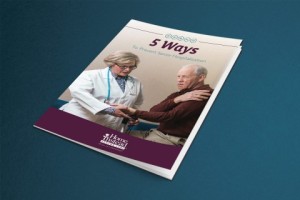As we can understand here in Minnesota, seniors are at their highest risk for hospitalization during the winter, according to 82% of nurses surveyed by Home Instead, Inc. This high risk is due to vulnerability to colds, influenza, pneumonia and other respiratory infections which is far more prevalent in senior care facilities compared to seniors living in their home. Weather-related falls and accidents partly due to icy Minnesota roads and sidewalks also play a factor.
The survey was part of research conducted by Home Instead, Inc. which indicates that the problem of preventable hospitalization of seniors is viewed as very to extremely serious by nearly 75% of the North American nurses surveyed who specialize in senior care.
Those same nurses estimate that almost half of senior hospitalizations (48.5%) could be prevented with early detection and  intervention. In addition, the survey indicates that families play a critical role in helping to keep their aging loved ones out of the hospital – with 99% of nurses surveyed saying that the role family plays is as important as the role played by health care professionals. If a family member is not available, home care services can help bridge the gap.
intervention. In addition, the survey indicates that families play a critical role in helping to keep their aging loved ones out of the hospital – with 99% of nurses surveyed saying that the role family plays is as important as the role played by health care professionals. If a family member is not available, home care services can help bridge the gap.
Families of Minneapolis seniors certainly have good reasons for keeping their loved ones out of the hospital but nurses noted the most important reasons are:
- They are at risk of hospital-acquired infections
- Seniors who have been hospitalized have a hard time getting back into their routine
- Hospitalization can cause more serious health declines
- Hospitalization leads to confusion for seniors
- Once hospitalized, seniors often do not regain full function. This is why it’s important to continue care even once the senior has gone home.
- Immobility in the hospital puts seniors at risk for various health issues
What are some things you can do to help prevent your senior loved one from being hospitalized?
Delaying or avoiding medical care is one of the most common actions by seniors that can put them at potential risk of needing hospitalization. Don’t ignore symptoms! The body is trying to tell you something… listen and relay how or what you are feeling to your doctor. In addition, not following medical orders can be a clear predictor of potential risk. Check in with your aging family members on a regular basis to make sure they are following doctor’s orders, taking their medication when prescribed and not avoiding medical care. Three of the top reasons some seniors don’t comply with doctor’s orders – unwillingness to change ways, denial of health issues and apathy – are all attitudinal.
There are other ways you can reduce the rate of hospitalization. Maintain a healthy diet, particularly if your loved one has diabetes. Learn 3 tips to help seniors avoid diabetes complications and 10 superfoods that should be part of your grocery list. Stay active both physically and mentally to prevent falls and accidents. Work a daily crossword puzzle or take a walk each day, even if it’s a short one. Also make sure you have sturdy shoes or a walking cane to prevent falls.To provide families with resources to minimize the major risk factors and to play an active role in hospitalization prevention, Home Instead, Inc. has created the Five Ways to Prevent Senior HospitalizationsSM guide. The guide focuses on these above-mentioned actions to help keep seniors safe at home and out of the hospital through proactive and preventative measures.
Each section of the guide outlines some warning signs and risk factors, as well as specific preventative steps and resources. The goal of this guide is to strengthen the role families can take in hospitalization prevention, and to help them feel more confident about actions they can take to keep their senior safe at home.
Survey results, overall, also indicated that unnecessary hospitalization of seniors can put them at risk for hospital-acquired infections. Involvement of families is key to helping to minimizing these events and in ensuring that that their loved one receives proper care if they do happen to be hospitalized. Nurses surveyed recommended providing education and instructional resources as a means of helping to reduce hospitalizations.
Hospitalizations should be prevented and it is possible. With the help and education from Home Instead Minneapolis, you can better care for your aging loved one in their home, help prevent time spent in a hospital and also reduce the risk for other health issues that come along with hospitalization. Together, we can keep your senior healthy and home instead.


[…] « Prevent Senior Hospitalization […]
[…] prevention and will continue to offer resources. In the previous two articles, we learned ways to prevent hospitalizations and risks to watch for. Many are basic, good-to-know ways to live that will help keep your senior […]
[…] Prevent Senior Hospitalizations […]